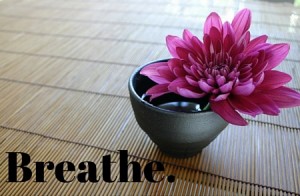I was talking with someone today about how sometimes our brains tell us things that in hindsight we laugh about. We think, Wow, I can’t believe I ever entertained that thought! For example: at the beginning of every school year I have a brief moment where I think, Crap. What if I just forget how to be an SLP? What if the kids walk into my office and I have no idea how to help them? This person had a similar experience, where today she thought, What if I walk into my class tonight and just can’t teach, what if I just forget how? We laughed about both of those thoughts, but in the moments they grab at us and we see them as hard truths, rather than just thoughts.
That got me thinking about similar moments- have you ever had a really awful moment or day, or maybe during a panic attack, or a crying spell, and you just think, What if this never ends? What if I cannot move through this? What if this does break me? [I just know in my heart that nearly every person has had this moment at least once – am I right?]
I rely on three things in those moments:
- Acceptance. I have found that the number one thing I can do to make those moments worse is to panic and fight them.
The more I entertain thoughts of, I can’t do this, I’m freaking out/panicking/hysterical/upset, this will break me, I am broken, I can’t move through this, it will never end, the harder it is.
A tiny space of calm is found within the storm when acceptance is embraced. I am having a really hard time right now. Oh. Okay. Yes. This is what’s happening. This is where I am. Okay. I’m fully here.
2. People. Not all people. And not most people. But the people who Get It, or who Get Me, and will love me through it, who will remind me, This will not break you, who will be present with me wherever I am. Those very few people are the lily pads leading me across the lake.
3. Tools. I don’t know about you, but in the moment, tools are really hard to remember to use. Also sometimes hard to believe that they’re going to do anything. So I find that practicing strategies and tools during calm moments, and semi-stressful moments, make them much more automatic to use during the super hard times. I think I could probably write a whole post on tools, and I think I will.
There are so many, good, concrete, realistic strategies out there. Some, we teach our kids each day at school or at home. Some, we learn ourselves. I think we all know that tools are more than just “take a deep breath” which my ukele-playing, beyond-insightful kiddo will tell you “doesn’t work” and “makes it worse!!!!” And you know what? Sometimes she’s right. So often the go-to advice is, “take a deep breath.” But really, a deep breath doesn’t always help. In the moment, it doesn’t initially matter how deep the breath is, it matters where it comes from. An attempt at a deep breath that involves a shallow breath where the shoulders raising up high is going to physically feel awful. But a breath from your stomach, where you put your hand on your stomach and try to breathe into it – that breath is going to feel good. And it will gradually deepen on its own.
So – while I ponder a post about my own tools that I’ve gathered and discovered over the years, I welcome any and all thoughts: What works for you during a hard time? Are there certain thoughts that grip you in terror but later you laugh about? Have you ever tried to accept where you’re at, however hard that may be?


